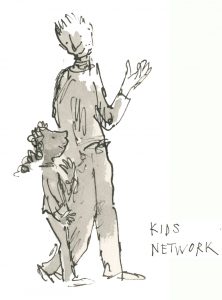CONTACT
Join our mailing list
Leave your email address below to be kept up to date
By clicking Subscribe, you are agreeing to our privacy policy and terms of use. You can read more about how we use your data here.

Illustration by Sir Quentin Blake
Get Involved
© The Kids Network 2023 | Website design by Goldfish
The Kids Network is a registered charity, number 1167178. Office address 3rd Floor, 86-90 Paul Street, London EC2A 4NE


Representative Role Models | Black History Month
Growing up as a Nigerian child from a disadvantaged background, there weren’t many people who looked like me to look up to. This posed a problem for a child who loved her parents dearly but couldn’t look to them as role models. It was only until a young Nigerian woman from my church took an interest in me at 15 that I had my first mentor.
Prior to building a relationship with my mentor, I was never seen as a cause for concern because I was a “good child” on paper. I was doing very well at school and was relatively obedient and responsible. While academic success remained very important to me as I got older, I found myself becoming a lot less focussed in school and employed harmful coping mechanisms to distract myself from my pressurising family life.
It was important for me to be able to talk to someone outside of my family. Meeting with my mentor often made me feel comfortable enough to share aspects of my life that I would not have been able to share with the other adults in my family. It was also important that she looked like me. As a fellow Nigerian, I knew that she understood parts of my culture in a way that someone from another ethnic background would not have been able to – at least not without explaining certain things that I would not have been able to do at a young age and that I would still feel uncomfortable trying to explain at the age of 22. Given our shared worldview, she was able to give realistic advice and share relevant experiences. She provided a level of support that I had never experienced before.
My own experiences have shown me just how big a part a representative role model plays in the life of a child. Despite this, there is a lack of volunteers from BME communities. I have found that some of the biggest barriers to volunteering for many people from BME communities are perceptions around the time and commitment involved. My mentor met with me often and taught me that I did not have to be a product of my circumstances. She encouraged me to aspire for more, to think long-term by setting yearly goals together and, most importantly, she was the first person who took an interest in my life and just listened.
The Kids Network suggests that mentors ease into the mentoring relationship by starting with meeting their mentee one-to-one for an hour after school or on the weekend for the first few weeks. As the mentoring relationship develops, mentors are given a monthly budget to spend 2-3 hours trying anything from boxing to trampolining with their mentee and are also encouraged to see the magic in all the free and local opportunities London has to offer. Occasionally, mentors also have the opportunity to join group activities with other mentor and mentee pairs. This regular contact makes the mentoring process more effective as mentees become increasingly comfortable to open up to their mentor.
I can confidently say that it is because of my mentor’s impact in my life that I am where I am today. She is someone that I will forever be grateful for and will always hold dear. She was the big sister I never had.
The Kids Network are looking for a diverse pool of mentors. If you would like to have a positive impact in a child’s life, apply to become a mentor on The Kids Network website.